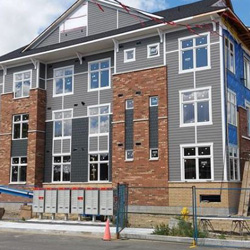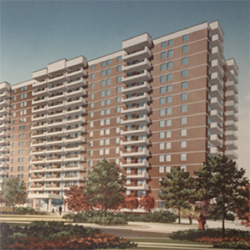The Landlord and Tenant Board (LTB) has three main roles:
- To resolve disputes between landlords and tenants through mediation or adjudication;
- To resolve eviction applications from co-ops; and
- To inform landlords and tenants about their rights and responsibilities under the Residential Tenancies Act (RTA).
What could tenants apply to the LTB for and what could they order the landlord to do?
Section 29 of the RTA states what issue a tenant or former tenant may bring to the Landlord and Tenant Board. It is important to know that you have up to one year after the alleged conduct giving rise to your application to apply to the LTB. In terms of involuntary exposure to second-hand smoke, most of the tenant applications argue that there is or was a breach of reasonable enjoyment (Section 29 (1) 3.).
If you file a T2 form (Application About Tenant Rights) stating that there was a breach of reasonable enjoyment, you can ask the LTB to order your landlord to do one or more of the following things:
- Pay you a rent abatement (This may be a lump sum payment the landlord pays the tenant to return part of the rent paid or it may may allow the tenant to pay less rent/no rent for a specified time period.)
- Stop the activity that led you to apply to the LTB
- Pay a fine to the LTB
- Terminate your tenancy on a certain date
- Pay you compensation for your repair or replacement costs
- Pay you compensation for the increased rent you have had to pay or will have to pay for one year (from the date you moved out)
- Pay you compensation for your expenses for moving, storage, etc.
- Pay you compensation for other expenses;
In previous cases the LTB has ordered landlords to seal units to try to prevent second-hand smoke from entering other units and to provide rent reductions, among other orders. When you make your application, make sure that you are asking the LTB to make an order within its jurisdiction.
Here is a list of factors that the LTB may consider:
- What evidence does the tenant have that smoke is entering the unit?
- Is the amount of smoke frequent, ongoing and a significant interference with the tenant’s use or enjoyment of the unit?
- Is the smoke affecting the health of the tenant(s)?
- What steps did the tenant take to minimize the smoke entering the unit or to attempt to solve the problem?
- If the landlord knew about the problem, and there was evidence of a significant amount of smoke entering the unit, did the landlord take reasonable steps to solve the problem?
Does involuntary exposure to second-hand smoke count as a breach of my right to reasonable enjoyment?
It depends. In certain cases, involuntary exposure to second-hand smoke can constitute a breach of reasonable enjoyment. Some LTB decisions are posted on the Canadian Legal Information Institute (CanLII) website.
Applications dealing with second-hand smoke often cite a breach of reasonable enjoyment. However, the adjudicator hearing an application must balance the rights of the smoker and/or landlord versus those of the person being exposed to second-hand smoke. The success of your application depends on your specific situation and how persuasively you (or your representative) can make the argument.
Simply having second-hand smoke in your unit would not be enough to successfully argue that reasonable enjoyment has been breached. To prove that second-hand smoke has caused a loss of reasonable enjoyment, evidence must be strong and compelling. You must provide proof that the amount of smoke is frequent, ongoing and significantly interfering with your use and reasonable enjoyment of the unit. This is not always easy, as there are no guidelines for what amount of smoke entering a home is considered significant or unreasonable. In addition to any negative health effects, you must demonstrate how second-hand smoke is preventing you from using your apartment in a normal way, or in a way you expected when you signed the lease. For example, if you are not using one or more rooms in your unit because you have sealed them up with tape or caulk to prevent the smoke from infiltrating the whole apartment. Arguments like this can be made stronger by referencing health problems experienced due to the smoke.
In buildings where smoking is allowed, landlords should be aware that the right to smoke is not absolute. If tenants can show that second-hand smoke is infiltrating their home from a neighbouring unit or balcony on a frequent and ongoing basis, and substantially interfering with their reasonable enjoyment, then landlords have a responsibility to remedy the situation.
How do I apply to the LTB? How much does it cost?
Visit the Landlord and Tenant Board to download an application form and view fees.
Do I need a lawyer or agent?
You are not required to have a lawyer or agent with you at a LTB hearing, you can present your own case. However, if you think that your case is difficult, or you would feel more comfortable if a lawyer or agent presents your case, you can hire one. If you have an agent, they must have written permission from you, which says that you want them to represent you at the hearing (or in mediation).
How can I prepare for my hearing?
Think about:
- What was included in the lease?
- Does it include a no-smoking clause?
- Is smoking permitted in the unit where you think the smoke is coming from?
- Did you ask about a no-smoking policy when you first rented your unit?
- Did the landlord advertise or otherwise communicate to you that the building was smoke-free?
- How long has the problem been occurring? Is this a new problem, or has it been going on since your tenancy began?
- What effect is the smoke having on your health?
- What health problems are you and/or your family experiencing due to involuntary exposure to the second-hand smoke?
- Does the second-hand smoke aggravate a pre-existing health condition, such as asthma, heart disease or high blood pressure?
- Do you have a letter from your doctor or healthcare provider about the effect of the smoke on your health?
- What steps have you taken to try to solve the problem before applying to the LTB?
- Did you take all reasonable steps to reduce the second-hand smoke entering your unit?
- Did you notify the landlord that there was a problem, and provide enough time for them to address it? Was the notice in writing or made verbally?
- Did you try to come up with a solution with the landlord or tenant who smokes?
- Did you turn down any solutions offered by the landlord, such as moving to another unit in the building or another complex owned by the landlord? If so, explain why the solution was not acceptable to you.
- What steps did the landlord take to address the problem once you notified them?
- Did you notify the landlord that there was a problem, and provide enough time for them to address it? Was the notice in writing or made verbally?
- Did the landlord take reasonable steps to correct the problem? What was the outcome?
- Did the landlord offer a solution? What was the outcome?
- Did the landlord try to seal off the source of the second-hand smoke? What was the outcome?
- Did the landlord talk to the smoking tenant? What was the outcome?
- Did the landlord attempt to come up with a solution with all parties? What was the outcome?
What are my chances of winning my case?
Every case is considered individually and on its own merit. There are a number of factors taken into consideration that contribute to the success of an application, including how you present yourself and how credible you are believed to be, what evidence you have, what you did prior to making the application to try and solve the problem, etc.
Read through some of the case law to get an idea of how previous cases dealing with second-hand smoke have been judged.
Disclaimer – The information in this section is of a general nature and is to be used for informational purposes only. This information is not legal advice. If you are unclear about your rights or responsibilities, we highly recommend that you seek legal advice from an appropriate professional.






